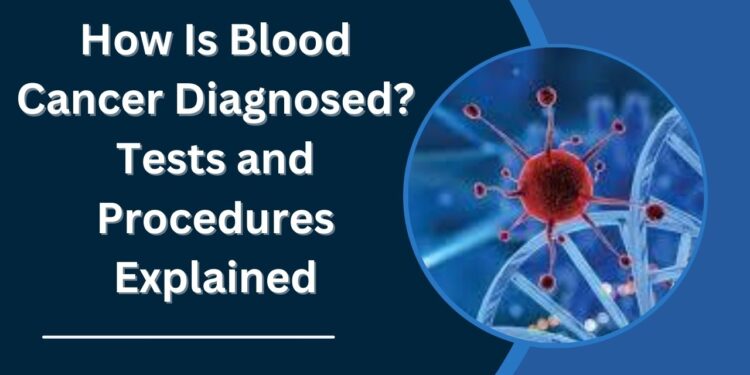Blood cancer, also known as hematologic cancer, refers to cancers that begin in the blood-forming tissue, such as the bone marrow or the lymphatic system. This category of cancer includes leukemia, lymphoma, and myeloma. Early diagnosis is crucial for effective blood cancer treatment because it can help in deciding the appropriate therapeutic approach, improving the patient’s chances of survival. In this article, we will explore how blood cancer is diagnosed through various tests and procedures, as well as touch upon blood cancer treatment in India.
1. Understanding Blood Cancer
Blood cancer disrupts the normal functioning of the blood cells, leading to abnormal growth or function. The three primary types of blood cancers are:
- Leukemia: Affects the bone marrow and blood, leading to the production of abnormal white blood cells.
- Lymphoma: Occurs when lymphocytes (a type of white blood cell) become cancerous, affecting the lymphatic system.
- Myeloma: Involves plasma cells, which are responsible for producing antibodies, and affects the bone marrow.
Each type of blood cancer has unique characteristics, but the signs and symptoms can overlap. Common symptoms include unexplained weight loss, persistent fatigue, frequent infections, bruising, or swollen lymph nodes. If any of these symptoms persist, it’s crucial to seek medical attention promptly.
2. Initial Consultation and Medical History Review
The diagnosis of blood cancer usually starts with a thorough medical history review and physical examination. The doctor will inquire about the patient’s symptoms, family history of blood cancer, previous illnesses, and any known risk factors. This information helps the doctor evaluate the likelihood of blood cancer and plan further tests.
The physical exam may involve checking for enlarged lymph nodes, spleen, or liver, as these can be signs of blood cancer. However, a physical examination alone is rarely enough to confirm a diagnosis, which is why laboratory tests and imaging are required.
3. Blood Tests
Blood tests are the first step in diagnosing blood cancer. They are commonly used to detect irregularities in the blood cells, which can indicate the presence of cancer.
- Complete Blood Count (CBC): A CBC measures the levels of red blood cells, white blood cells, and platelets in the blood. Abnormalities in these counts can indicate leukemia or other types of blood cancer. For example, an unusually high white blood cell count could be a sign of leukemia.
- Peripheral Blood Smear: This test involves examining a sample of blood under a microscope. It helps identify abnormal blood cells, which may suggest blood cancer. For instance, leukemia often shows immature or abnormal white blood cells.
- Blood Chemistry Tests: These tests measure levels of various substances in the blood, such as electrolytes, proteins, and enzymes, that can be affected by blood cancer.
4. Bone Marrow Biopsy
A bone marrow biopsy is one of the most definitive tests for diagnosing blood cancer. The bone marrow, located inside the bones, produces blood cells. In many cases of blood cancer, the bone marrow is where the cancerous cells originate.
During the biopsy, a small sample of bone marrow is taken from the pelvic bone using a needle. The sample is then examined under a microscope for signs of cancerous cells. This test is particularly helpful in diagnosing leukemia, myeloma, and certain types of lymphoma.
5. Imaging Tests
While blood tests and bone marrow biopsies are essential, imaging tests can provide additional insight into the extent of the disease. Common imaging tests include:
- X-rays: X-rays can help detect bone damage or the presence of tumors.
- CT Scan (Computed Tomography): CT scans provide detailed cross-sectional images of the body and can help detect enlarged lymph nodes, spleen, or other organs affected by lymphoma or leukemia.
- PET Scan (Positron Emission Tomography): PET scans are used to detect areas of high metabolic activity, which can indicate cancer.
- MRI (Magnetic Resonance Imaging): MRIs may be used in cases of multiple myeloma to assess bone damage and the involvement of organs.
Imaging tests are particularly useful for diagnosing lymphoma and monitoring the spread of blood cancer to other parts of the body.
6. Flow Cytometry and Cytogenetic Testing
Flow cytometry is a technique that analyzes the characteristics of cells, including their size, shape, and structure. In blood cancer diagnosis, it can help identify specific types of abnormal blood cells, providing more detailed information on the type of leukemia or lymphoma present.
Cytogenetic testing examines the chromosomes of cancerous cells for genetic abnormalities. This test can help determine the specific type of leukemia, as certain genetic mutations are associated with different forms of blood cancer. Identifying these genetic changes can also provide insight into prognosis and treatment options.
7. Lymph Node Biopsy (for Lymphoma)
For patients suspected of having lymphoma, a lymph node biopsy is often performed. This involves removing a sample of an enlarged lymph node for laboratory analysis. The biopsy helps determine whether cancer cells are present in the lymph nodes and provides valuable information about the specific type of lymphoma.
8. Genetic Testing and Molecular Profiling
In some cases, genetic testing and molecular profiling are used to evaluate the specific mutations in cancer cells. This can help determine the type of blood cancer, as well as how it might respond to certain treatments. Understanding the genetic makeup of cancer cells can also assist doctors in predicting the disease’s progression and the potential for remission.
9. Treatment Options for Blood Cancer
Once a diagnosis is confirmed, the next step is to develop a treatment plan tailored to the patient’s specific type of blood cancer. The type, stage, and genetic profile of the cancer all play a role in deciding the most effective treatment approach. Common blood cancer treatments include:
- Chemotherapy: Powerful drugs are used to kill cancer cells or stop their growth.
- Radiation Therapy: High-energy rays are used to target and kill cancer cells.
- Stem Cell Transplant: Replacing damaged bone marrow with healthy stem cells can offer a chance for remission in some patients.
- Targeted Therapy: Drugs that target specific molecules involved in cancer cell growth are used in some types of blood cancer, especially leukemia.
- Immunotherapy: This therapy helps the body’s immune system fight cancer more effectively.
10. Blood Cancer Treatment in India
India has become a global hub for cancer treatment due to its high-quality healthcare facilities and advanced medical technology. Many world-class hospitals in India specialize in blood cancer treatment in India, offering a variety of treatment options, including chemotherapy, radiation therapy, and stem cell transplants.
Moreover, India’s medical professionals are highly skilled, and the cost of treatment is significantly lower compared to countries like the United States and the United Kingdom. This makes blood cancer treatment in India an attractive option for both domestic and international patients seeking affordable yet effective care.
Conclusion
Diagnosing blood cancer involves a multi-step process that includes a thorough medical history review, blood tests, bone marrow biopsies, imaging tests, and advanced molecular profiling. Early detection plays a key role in improving outcomes, and with a variety of treatment options available, including cutting-edge therapies, patients diagnosed with blood cancer can access effective care. If you or someone you know is facing a blood cancer diagnosis, seeking expert care in reputable medical centers, particularly in countries like India, can provide the best hope for a successful treatment journey.
for more(click here)

















